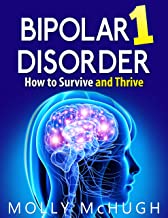Bipolar I
Resources for Patients and Caregivers
Bipolar I Disorder— defined by manic episodes that last at least 7 days, or by manic symptoms that are so severe that the person needs immediate hospital care. Usually, depressive episodes occur as well, typically lasting at least 2 weeks.
Cluster Number:
Wiki Number: 08-Bipolar I
Diagnosis: This requires just one full manic episode where the individual may be “high” for several days.
US Patients: 1% of the US population in their lifetimes.
World Patients:
Sex Ratio:
Age Onset:
Brain Area:
Symptoms: Typically it will be followed by one or more depressive stretches of time.
Progression: Relatively good, may last 6 months or 25% go to PTSD or Major Depressive Disorder
Causes:
Medications:Can be reduced by other prescribed drugs.
Therapies:
Youtube Video: Faces of Bipolar Disorder (PART 2) “Bipolar Type 1”
Amazon or Library Book: Bipolar Disorder 1
How to Survive and Thrive
Click the book to link or order from Amazon.

